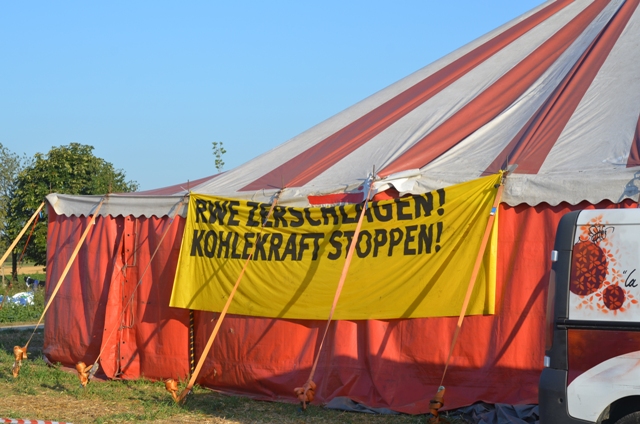A living recipe by Chaga Collective: for joyful resistance, guided by fungi, ferment, and the courage to not know exactly what will flourish
(As with all wild ferments, quantities are flexible, intuitive, and community-sourced)
Optional (but highly recommended):
“We saw a cabaret once and something fermented.”
Observe something weird, intimate, off-beat: a cabaret, a clown, a wedding performance. Let it tingle in your gut.
Ask yourselves: What if we fermented something like that, but with degrowth?
Trust that hunch. Feed it love, not feasibility studies.
Mycelium teaching: Mycelium doesn’t rush toward the fruiting body. It spreads underground, quietly. You’re not organizing an event. You’re weaving a possibility.
“Open the call. But not just any call. A call with care, with clarity, with humour.”
Draft a call that welcomes chaos, that de-centres professionalism, and makes room for poets, economists, dancers, clowns, and people who never thought they'd be in a show.
Use art, not bureaucracy. Share it widely and wildly, like mushrooms spread spores.
Know any local artist with activistic force? Pass them an invitation to participate.
Let the first applications arrive like wild yeasts: generous, unexpected, alive.
Fermentation tip: The brine is salty, not sterile. Boundaries are love. Clear what you can and let the rest bubble.
“Telegram group, shared folder, first Zoom. Let the micro-organisms meet.”
Don’t rush into deliverables. Begin with:
Mycelium teaching: Community doesn't emerge from agendas. It grows from shared presence.
Keep it moist, not corporate.
“Someone left the group. Someone joined. A venue appeared. A protest poem arrived. The ferment thickens.”
Let the project respond to its surroundings. Don’t fossilize the plan, compost it when needed.
Create a buddy system for feedback. Organise a sofa-surf directory. Bake logistical spreadsheets with love.
At this stage, things might smell weird. That’s okay. It means it’s alive.
Fermentation tip: You can’t rush flavour. But you can taste along the way. Check the vibe.
Adjust salt. Add garlic.
“How do we bring the audience in? Not just as viewers: as participating spores.”
Think beyond the stage. Keep open slots. Accept last-minute acts. Ask:
Mycelium teaching: Fruit doesn’t emerge in isolation. It’s the visible sign of an unseen ecology carrying the nourishing conditions for seeds to take root and trees to thrive. Invite the forest in.
“A sold-out cabaret with no general rehearsal. But overflowing presence.”
Let it all come together: messily, beautifully. The show is not a product. It’s a moment. A collective act of courage.
No one’s the director. No one’s the star. Everyone's mycelium.
You might:
Fermentation tip: Trust the unknown. Taste the surprise. Laugh. Let go. You did it.
“We are bodies that feel, that express, that move. That, unfortunately, rarely happen through a screen.”
And yet… something fermented.
Most virtual collaborations go stale. They exhaust. They flatten.
They leave us Zoom-fatigued, emotionally fragmented, and aching for air.
So why did this Degrowth Cabaret not rot but ripen?
The answer may lie in two intertwined forces:
We trusted the process: not because it was structured, but because it was shared.
We let uncertainty breathe. We trusted each other to hold the vessel.
In a space where misunderstanding is easy, we fermented a shared language.
Not one of identical vocabularies, but of mutual resonance: glances, glitches, poems, farts, silences.
A language born of the collective process, not imposed from outside.
Cabaret became a shared tongue. A slow grammar of becoming.
We didn’t gather to fight the monster: we gathered to dance with each other.
This ferment wasn’t just about resistance. It was about irresistibility.
While activism often asks “what are you against?”, this cabaret asked:
“What would you gift the world, if it listened with an open heart for five minutes?”
And so, we sang, danced, wept, laughed, and, by doing so, we showed that a degrowth future is not only necessary, but joyful.
We created not just a show, but a future rehearsal.
A way to say:
If you’re reading this wondering if your digital collective cabaret will crumble,
remember: the trick is not to perfect it.
Even a screen can be a petri dish.
The trick is to nurture the medium,
listen to the microbes,
and laugh together when things bubble over.
With mycelial magic,
the Chaga Collective
chagacollective@proton.me

The rise of far-right globalization criticism requires a new role for the Degrowth movement. ‘Progressive De-Globalization‘ could be the counter-project that is urgently needed. After the German and Austrian elections, it becomes clear once more that the rise of the new far-right is not a temporary phenomenon. Neither the difficult Brexit negotiations nor the missteps of Donald Trump are sto...

By Lasse Thiele The first part of this article offered an introduction to post-development thought, which for decades has been trying to deconstruct Western models of prosperity and growth. This second part introduces some of the countless linkages between critiques of development and contemporary European critiques of growth. The discourse on sufficiency for example - the idea of recognizing...

For our Degrowth in Action - Climate Justice Summer School 2015 we are currently looking for contributors to our courses. The summer school will take place from 9 to 14 August 2015 in the lignite-mining region of the Rhineland in cooperation with the annual climate camp. The courses will be at the centre of the Summer School and run for 4 or 2 days, thus giving the opportunity to dive deeper in...